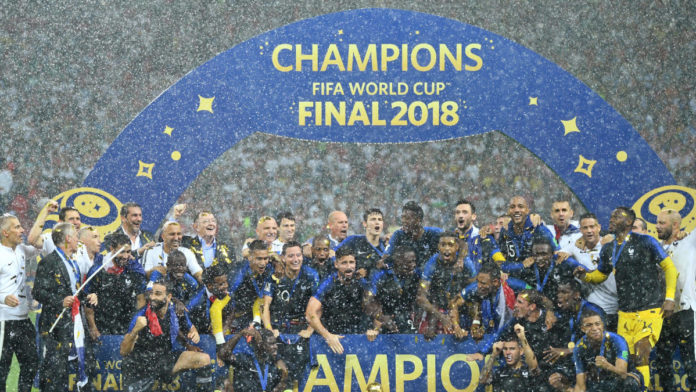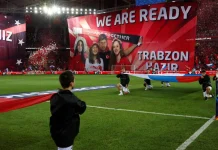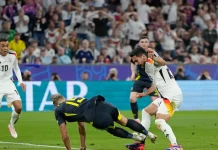(Sports Illustrated) – It’s been five years since the United States Department of Justice shocked the sports world by indicting nine FIFA officials and five corporate executives on racketeering, wire fraud and money laundering charges. Under the administration of President Barack Obama, the Justice Department sought to expose FIFA’s “rampant, systemic and deep-rooted” system of corruption. Details about exorbitant bribes and blatant kickbacks connected to the awarding of the World Cup and other international soccer tournaments would soon surface. A number of prominent figures, including the late former Concacaf general secretary Chuck Blazer and former Brazilian Football Confederation president José Maria Marin, pleaded guilty or were convicted. Other defendants have used the limits of extradition treaties to evade the reach of American law enforcement and U.S. courts.
Much has changed over the last five years. FIFA’s leadership has turned over. The Justice Department is now under the administration of President Donald Trump. And the world faces a pandemic that has reshaped daily life.
Yet one thing hasn’t changed: the Justice Department’s pursuit of FIFA corruption.
On Monday, prosecutors unsealed an indictment in federal court in Brooklyn charging three sports media executives and a sports marketing company with a bevy of charges including wire fraud, money laundering and racketeering conspiracy. The defendants are accused of bribing soccer officials in order to obtain confidential bidding information for broadcasting rights connected to the 2018 World Cup, which was held in Russia, and the 2022 World Cup, which will be played in Qatar. The indictment is the third superseding indictment, meaning it replaces the Justice Department’s previous two indictments in the FIFA corruption case.
In doing so, it names more names and adds more details. Here’s a closer look:
The sports industry executives who face charges
The newest defendants in the FIFA corruption prosecution are highly accomplished figures in the sports media and sports broadcasting industries. Hernan Lopez, a citizen of both the U.S. and Argentina, is one of them. He served as CEO of Fox International Channels, which is a subsidiary of Fox. He also oversaw Fox’s sports broadcasting businesses in Latin America. Lopez is accused of partaking in a wide range of misconduct, including conspiring with others to pay and facilitate the concealment of annual bribe and kickback payments to high-ranking CONMEBOL officials.
Carlos Martinez, a citizen of both the U.S. and Mexico, is another defendant who has enjoyed considerable career success. He served as president of Fox International Channels and was a high-ranking executive of the affiliated network, Fox Latin American Channel. Martinez was responsible for developing and carrying out Fox’s sports broadcasting operations in Latin America. Martinez is linked to Lopez in alleged criminal activities. According to prosecutors, the two “relied on loyalty secured through the payment of bribes to certain CONMEBOL officials in connection with the Copa Libertadores to advance the business interests of Fox.”
Defendant Gerard Romy has a similar profile. A citizen of Spain, Romy served as a top executive and shareholder of Imagina Audiovisual SL, a multinational media conglomerate based in Barcelona that owned subsidiaries around the world. One of those subsidiaries is US Imagina, which is based in Miami and negotiated television contracts in the U.S. and Latin America. US Imagina had its own subsidiaries. Romy is considered to have played an instrumental hand in advancing the bribery scheme tied to this network of affiliated companies.
In addition, the Uruguayan sports marketing company Full Play Group S.A. faces charges. Full Play was owned by other defendants, Argentina’s Idjgo Jinkis and his son, Mariano Jinkis. The two men were charged in 2015 and, in the eyes of the Justice Department, remain fugitives. They operated Full Play from a principal office in Buenos Aires. According to prosecutors, Full Play helped to facilitate illegal bribes.
The alleged wrongdoing disrupted the allocation of TV rights–and the selection of host nations for World Cups
As told by prosecutors, the scheme that led to Monday’s charges involved the use of shell companies and sham consulting contracts to hide bribes and conceal kickbacks related to lucrative broadcast rights deals. Essentially, ill-gotten gains were masqueraded as legitimate transactions.
To that end, the defendants and co-conspirators allegedly funneled cash and bank wire transfers through fake corporate entities and similar money-laundering instruments. The alleged crimes took place over a period of more than two decades and into 2015. Prosecutors argue the defendants attempted to corrupt the sport of soccer worldwide. As a result, FIFA and its six continental confederations, along with affiliated regional federations, member associations and sports marketing and broadcast companies, are all portrayed as institutional victims rather than as wrongdoers.
To more specifically illustrate the illegal activities, the indictment describes how Lopez and Martinez allegedly oversaw a scheme whereby CONMEBOL officials were bribed. In exchange, Lopez and Martinez secured the rights to broadcast the Copa Libertadores and other marquee tournaments. This scheme also helped Lopez and Martinez unlawfully secure confidential bidding information for the rights to broadcast the 2018 and 2022 World Cup tournaments in the United States. Fox, which as described above is linked to Lopez and Martinez, won the bidding of those rights.
For a second illustration, consider the alleged wrongdoing of Romy. He is accused of paying millions of dollars to various officials tied to the Caribbean Football Union (“CFU”) and the Central American Football Union so that he would secure media and marketing rights to FIFA World Cup qualifiers. Prosecutors assert that about eight years ago, Romy and co-conspirators agreed to bribe Jeffrey Webb, the president of Concacaf and a top CFU official, to the tune of $3 million. The alleged bribe was to secure rights associated with World Cup qualifiers for the 2018 and 2022 cycles.
While the Justice Department’s preceding indictments raised the same overarching point, it’s worth noting the scope of alleged crimes goes well beyond the bidding of TV rights. Monday’s indictment explains how FIFA executive committee members were offered bribes or received bribes in connection with their votes in favor of Russia to host the 2018 World Cup and Qatar to host the 2022 World Cup. Disgraced former FIFA vice president Jack Warner and Guatemalan official Rafael Salguero were alleged to have taken approximately $5 million and $1 million, respectively, to vote for Russia’s 2018 bid. South American executive committee members Ricardo Teixeira and Nicolas Leoz and an unnamed co-conspirator were alleged to have received payments for their 2022 Qatar votes.
There is a clear connection between the awarding of a World Cup host, broadcasting rights and multiple layers of bribes. Specifically, bribes are used to ensure that a particular bidding country is named the host of a World Cup. That outcome is followed by a separation competition—and a separate set of bribes—for the regional broadcasting rights to that World Cup and its qualifying matches. Put bluntly, there is corruption at every turn and it involves a network of influential figures.
Impact of the new charges on soccer and the broadcasting world
Monday’s charges comprise the latest chapter in the Justice Department’s campaign against international soccer corruption and its use of U.S. financial institutions—particularly wire transfers through American banks—to advance white-collar crimes. The charges reflect the same theory of crime as before: (1) the use of bribes and kickbacks to secure lucrative rights associated with soccer matches and (2) the corresponding deployment of sham entities to launder the money and make it appear legitimate. The charges also involve, and build-on, a similar roster of figures from 2015. One is Warner, who allegedly accepted a $10 million bribe from South Africa to ensure the country would host the 2010 World Cup.
The key difference now is that the scope of the Justice Department’s case threatens a wider cast of professionals. Those professionals include executives in sports media and sports broadcasting.
It’s clear from the unsealed indictment that prosecutors are in possession of a treasure trove of evidence and witness testimony. That isn’t necessarily surprising since a number of persons charged five years ago have since cut deals with prosecutors. Those deals are predicated on a basic transaction: in exchange for a lighter punishment, the defendant agrees to cooperate fully by (1) sharing any and all relevant emails, texts, bank statements and similar records establishing proof of criminal activity and (2) providing sworn testimony that implicates current and former colleagues who have been targeted by the feds. Other persons of interest to prosecutors, including witnesses to criminal activity, are also inclined to cooperate in order to avoid being charged.
Keep in mind, this is the same approach the FBI and the Justice Department use to take down the mafia and similar types of organized criminal syndicates. The playbook begins with the charging of an initial group of syndicate members, namely those who partook in activity that left a trail of evidence or those who unwittingly admitted to committing crimes during recorded conversations with undercover agents or confidential informants. Some of those initially charged are advised by their attorneys and families to cooperate and share everything to save themselves. In doing so, they provide FBI agents with new names and supplemental forms of evidence as well as implicating testimony. New persons within the syndicate are then charged, some of whom then cut deals. The process continues to play out, ideally until the corruption is stopped.
For persons connected to the awarding of broadcasting rights for the 2018 and 2022 World Cups, along with other tournaments and matches referenced in the indictment, Monday’s developments should give them pause for concern. Some have likely already been contacted by federal agents, others will be. That doesn’t mean they broke the law or will be charged with crimes, but the closer they are to the illegal activity, the more they and their attorneys ought to worry.
Next steps: criminal and civil
According to the Justice Department, Lopez and Martinez are scheduled to be arraigned this Thursday before U.S. District Judge Pamela Chen in Brooklyn. At the arraignment, the defendants will be formally read the charges and asked to enter a plea of guilty or not guilty.
If ultimately convicted, the defendants could be sentenced to decades in prison. However, as first-time non-violent offenders, they would likely receive much shorter sentences. Still, the thought of spending a handful of years in prison would be terrifying to most. It is a thought that could motivate the defendants to seek plea deals with prosecutors.
You may be wondering how Thursday’s arraignment could take place given the coronavirus disease pandemic. While the pandemic has caused courts to postpone many hearings and conduct other hearings telephonically, courts continue to try to hold hearings for criminal matters. Criminal matters are, of course, more important to society than civil matters. They involve allegations of crimes and could lead to defendants losing their freedoms.
The defendants will have opportunities to defend themselves. Being charged with a crime is not the same as being convicted, the latter of which requires proof beyond a reasonable doubt. At the same, being charged with a federal crime seldom leads to exoneration. According to data compiled by the Pew Research Center, 90% of defendants charged with federal crimes plead guilty. Only 2% of defendants go to trial, and of those 83% are convicted. This data is very discouraging for people charged with federal crimes. It reflects why criminal defense attorneys often advise clients who face federal charges to think seriously about negotiating an outcome with prosecutors where they might have to spend months or years behind bars (instead of the risk of going to trial, being convicted and then being sentenced to decades in prison).
As a final point, the awarding of TV contracts in a fraudulent bidding process means that a group of networks lost out on bids due to bribes and kickbacks. Attorneys for ESPN and other losing bidders likely read Monday’s indictment with interest. It’s not inconceivable they could weigh potential legal action over losing bids in a corrupted process. While the statutes of limitation for taking action may have already expired, and while the bidding process itself might have compelled bidding networks to contractually forgo possible legal claims, it’s within the realm of possibility that losing networks might explore the possibility of suing FIFA and related parties for fraud. They might even explore a case against Fox on a theory of vicarious liability—namely, responsibility for wrongful acts by Lopez and Martinez that benefited Fox.












